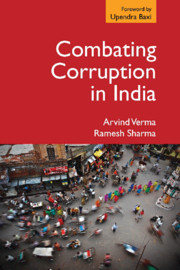Book contents
8 - Alternate Solutions
from Part III - Way Forward: Alternate Solutions
Published online by Cambridge University Press: 13 November 2018
Summary
The common belief in combating corruption is that the independence of investigation agencies must be ensured and guaranteed either by a constitutional or a statutory body. Additionally, the entire Criminal Justice System, including the police, prosecution and the judiciary be reformed and strengthened in terms of personnel, training, technical and financial resources. However, we believe that these measures are inadequate to combat corruption effectively in a country like India, given its size, complexity and historical experience. These agencies are only triggered into motion after the corrupt deed has occurred. The emphasis must equally be upon prevention of corruption. Here we examine some alternate solutions focused on prevention and outside the realm of policing. An innovative ‘doctrine of housekeeping’, is propounded so that the responsibility and accountability for monitoring and disbursal of funds must essentially devolve on the head of the department/ministry concerned. We describe how the adoption of this principle will go a long way in the prevention of corruption and economic crimes. Significantly, we argue that corruption can be reduced realistically only by empowering the citizens to hold public officials directly accountable. A vigilant and informed citizenry is needed to safeguard abuse of authority. For this it is necessary that the citizens engage with the functions of administration and have the means to hold officials accountable for performance. We outline some innovations that have evolved by expanding use of ICT platforms, social media, citizen initiatives and rise of informed and concerned citizen groups. We also propose developing a variety of means to bring in the private sector, volunteers, non- governmental bodies and transparency in the functions of public institutions. We argue that open, knowledge-based, publicly-funded institutions best serve the community and help maintain the integrity of public officials.
Introduction
We started this research after witnessing the anger and frustration with the elected officials for their indifference to corruption. The Anna movement is past many years and Lokpal is still to come into action. Yet we believe that we should not be despondent with the politicians and ruling establishment. India is a democracy and the people are supreme who elect their government regularly and astutely. The frequent changes in the government and the undisputed ‘incumbency’ factor in elections are a testimony to the maturity of Indian voters. The politicians have to listen to the people and take steps to address their concerns and grievances.
- Type
- Chapter
- Information
- Combating Corruption in India , pp. 249 - 286Publisher: Cambridge University PressPrint publication year: 2018



